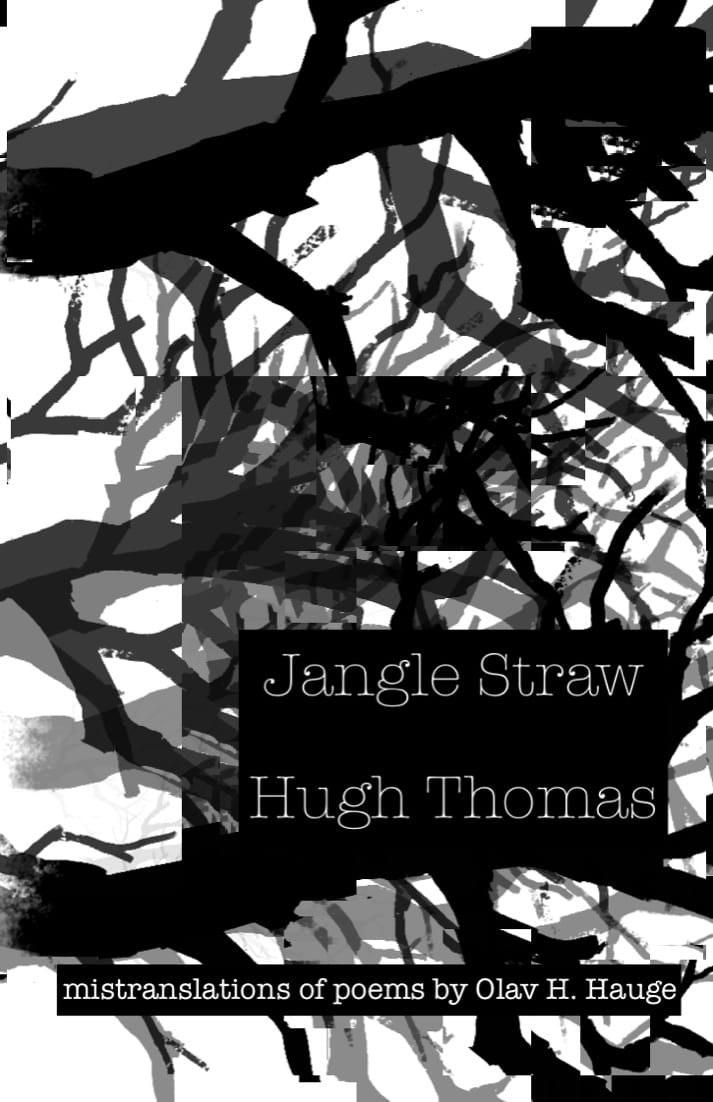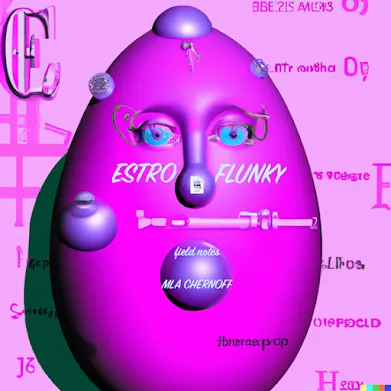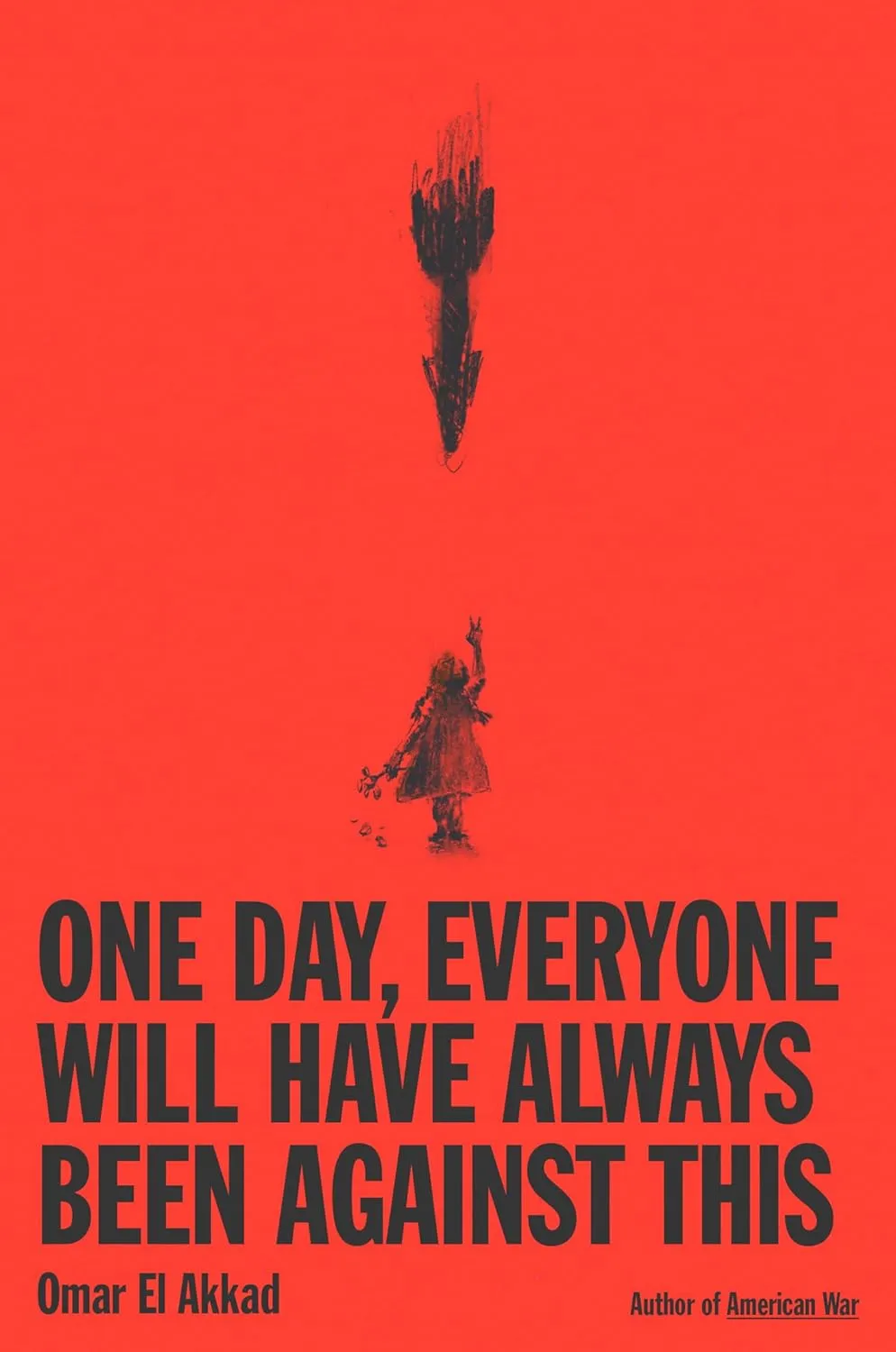Hugh Thomas, Jangle Straw
This brief collection of mistranslations could only happen in Montreal. It has something of the city in it, I can’t quite put my finger on it.

The first thing I do upon opening Jangle Straw by Hugh Thomas is take a moment to hearken back to that wonderful night we read at James Hawes’ Turret House Press launch event in the suburban neighbourhood of Hamstead in Montreal, at the local library community centre. “Jay, it was great reading with you!” It was great reading with you, too, Hugh.
The chap in front of me is dedicated to Dag T. Straumsvåg, an editor and publisher of A + D Press, poet, and translator of Stuart Ross, if I recall correctly, into Norwegian, or Nynorsk, to be actually correct. He is mentioned prominently in Ross’s 2022 Book of Grief and Hamburgers.
As far back as 2018, Stuart Ross collaborated with Thomas, Straumsvåg, and Ottawa publisher Marilyn Irwin via shreeking violet press to publish Eleven Elleve Alive. It was a set of poems by Ross (Eleven), then translated into Nynorsk by Straumsvåg (Elleve), and translated back into English by Thomas (Alive), which Stuart Ross commented on in his original Facebook post: “I hate that Hugh’s poems are better than my originals!” Only 7 remain in Irwin’s Etsy store for those interested.
Their collaboration in 2017 also resulted in 100 poems by Stuart Ross and one by Nelson Ball being translated into Nynorsk for the journal Du mitt Nordmøre.
If you’re a fan, you may be delighted to notice a comment left by the late Michael Dennis on one of Robert Hedin’s translations of Straumsvåg on Stuart Ross’s The Week Shall Inherit The Verse circa 2015.
In 2024, Straumsvåg collaborated with surrealist Kingston poet Jason Heroux, who I am also a fan of.
Olav H. Hauge, on the other hand, is a Norwegian translator, poet and horticulturalist who lived nearly the entirety of the 20th century. Born in 1908, he worked as a fruit farmer and gardener in his native Ulvik, “in the old pre-commercial gift-giving society” where “half his life was spent in the world of literature.” He published his first formal verse in 1946, then moved into modernism and concrete poetry as his career blossomed.
In 1985, Robin Fulton Macpherson, a Scottish poet born in 1937, translated a selection of his poems. He also published Hauge’s Leaf Huts and Snow Houses through Anvil Press in 2003. His translations of Swedish authors such as Tomas Tranströmer and Lars Gustafsson are far more prominent, whereas Hauge represents more of an outlier among his works linguistically speaking.
This, coming back to Hugh Thomas, makes these renditions somewhat absurd in their own right. They are mistranslations, unremittingly. Thomas intimates in the back of his book, opposite his author photo, “These poems are deliberate mistranslations of poems by Olav Hauge.” Then explains further, “At the same time as introducing these deviations from the original poems, I try to stay faithful to how the original poems move, generally following them line by line, and often even word by word. It’s a bit like trying to travel around Montreal relying on nothing but a very detailed map of Ulvik.”
I still remember the sensation I felt hearing him read in 2023, seated in the audience alongside my partner Patrycja. The room was alight with mirth from his measured pairings of hand talking and crisp, demure enunciations. We were all listening, watching and giggling. It was such a great night.
The collection’s first poem is “My poems are made of wood.” He has a note on this in the back, specifying his deliberate mistranslation of Norwegian tri (“three”) for tre (“tree, wood”). This sort of anti-Oulipien streak runs throughout Thomas’s work, and it is joyful and rebellious in its own secretive way, funny or significant perhaps because he teaches mathematics at UQAM. I’ve always enjoyed picking his brain for feedback on fractals, polygons and irrational numbers, and I come up with inventive questions on numbers every time we meet; I can’t help it.
The definition of things is often not worthwhile. Reading this first poem definitely has a surrealist effect, but the intent is more in tune with Apollinaire, perhaps, than Paul Éluard, say, and not immediately the label I would pin to it. It’s something more elusive. This is almost a stereogram of the way the bilingual mind works reading in another language, captured between glass panels as a sort of still to be viewed and appreciated fractured, as is.
Take a look with me:
My poems are made of wood
My poems are made of wood,
he said.
Poems don’t count!
Emily threw hers
off a cliff, I
can’t believe I told you.
Then she unfolded a teabag
and started another one.
That was her right. A good poem
smells like you.
Otherwise it goes moldy and falls apart.
These poems tend to draw on Chinese poetry, which tends to sound like a Nelson Ball poem. If anyone should be handling mistranslations of Dag Straumsvåg, it is calculably Hugh Thomas. For lack of a sounder expression, there is something that feels perfect. I am actively fighting the urge to copy out the entire contents of the chapbook to illustrate my point. Still, the best would be to encounter James Hawes at any local Montreal event and buy a copy from his table, or contact him through Turret House Press and ask him to mail you one.
I won’t often make this refrain, but it will likely occur again at some point in the course of my writing reviews. However, this brief collection of mistranslations could only happen in Montreal. It has something of the city in it, I can’t quite put my finger on it. Something about comfortable unfamiliarity and endless shifting lines of civil infrastructure and city planning divided unevenly by borough and perpendicular freeways. That’s what this is, in essence, the embodiment of a culture as composed by a poet and translator who superimposes his topology of being into hallucinatory minimalist verses. And I trust Hugh Thomas’s judgment, as well as Straumsvåg, who assisted in this collaboration with Thomas, that this is a real translation of everything Olav Hauge represents to Norway, or at least Dag Straumsvåg’s Norway, titrated, scaled in powder form to several decimal points for exactness, and put under the microscope, turning this science into an art, or the experience of observing art. A process not unfamiliar to editor Sarah Burgoyne, author of Mechanophilia (also published with Anvil!).
To unstretch the metaphor, there is a knowing impossible to convey literally present in every line in this volume, and it’s brief but it’s tangible, real.
Eight o’clock
Eight o'clock,
Einstein,
and you called at eleven.
I’m staying til
I can eat rocks,
then I’m coming over.
It doesn’t get simpler than that.
Bibelotages Newsletter
Join the newsletter to receive the latest updates in your inbox.



